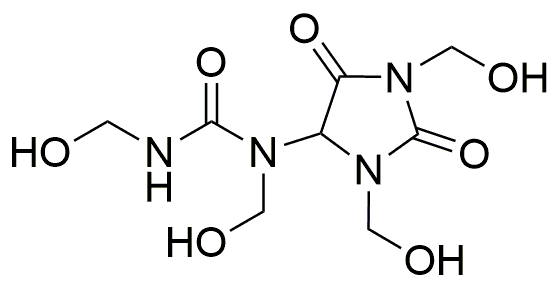Diazolidinyl urea is widely utilized in research focused on:
- Cosmetics and Personal Care: Commonly used as a preservative in lotions, creams, and shampoos, it helps extend shelf life by preventing microbial growth.
- Pharmaceuticals: Acts as a stabilizer in various formulations, ensuring the efficacy and safety of medications over time.
- Industrial Applications: Employed in the production of adhesives and coatings, enhancing product durability and performance.
- Textile Industry: Utilized in textile treatments to improve fabric resistance to bacteria and fungi, thereby increasing the lifespan of garments.
- Research Laboratories: Serves as a reagent in biochemical assays, aiding in the study of enzyme activity and protein interactions.
Informations générales
Propriétés
Sécurité et réglementation
Applications
Diazolidinyl urea is widely utilized in research focused on:
- Cosmetics and Personal Care: Commonly used as a preservative in lotions, creams, and shampoos, it helps extend shelf life by preventing microbial growth.
- Pharmaceuticals: Acts as a stabilizer in various formulations, ensuring the efficacy and safety of medications over time.
- Industrial Applications: Employed in the production of adhesives and coatings, enhancing product durability and performance.
- Textile Industry: Utilized in textile treatments to improve fabric resistance to bacteria and fungi, thereby increasing the lifespan of garments.
- Research Laboratories: Serves as a reagent in biochemical assays, aiding in the study of enzyme activity and protein interactions.
Documents
Fiches de données de sécurité (FDS)
La FDS fournit des informations de sécurité complètes sur la manipulation, le stockage et l’élimination du produit.
Spécifications du produit (PS)
Le PS fournit une description complète des propriétés du produit, notamment sa composition chimique, son état physique, sa pureté et les exigences de stockage. Il détaille également les plages de qualité acceptables et les applications prévues du produit.
Certificats d'analyse (COA)
Recherchez des certificats d'analyse (COA) en saisissant le numéro de lot du produit. Les numéros de lot et de lot se trouvent sur l'étiquette d'un produit, après les mots « Lot » ou « Lot de fabrication ».
Numéro de catalogue
Numéro de lot/série
Certificats d'origine (COO)
Ce certificat d'exploitation confirme le pays dans lequel le produit a été fabriqué, et détaille également les matériaux et composants utilisés et s'il est issu de sources naturelles, synthétiques ou autres sources spécifiques. Ce certificat peut être requis pour les douanes, le commerce et la conformité réglementaire.
Numéro de catalogue
Numéro de lot/série
Fiches de données de sécurité (FDS)
La FDS fournit des informations de sécurité complètes sur la manipulation, le stockage et l’élimination du produit.
DownloadSpécifications du produit (PS)
Le PS fournit une description complète des propriétés du produit, notamment sa composition chimique, son état physique, sa pureté et les exigences de stockage. Il détaille également les plages de qualité acceptables et les applications prévues du produit.
DownloadCertificats d'analyse (COA)
Recherchez des certificats d'analyse (COA) en saisissant le numéro de lot du produit. Les numéros de lot et de lot se trouvent sur l'étiquette d'un produit, après les mots « Lot » ou « Lot de fabrication ».
Numéro de catalogue
Numéro de lot/série
Certificats d'origine (COO)
Ce certificat d'exploitation confirme le pays dans lequel le produit a été fabriqué, et détaille également les matériaux et composants utilisés et s'il est issu de sources naturelles, synthétiques ou autres sources spécifiques. Ce certificat peut être requis pour les douanes, le commerce et la conformité réglementaire.


